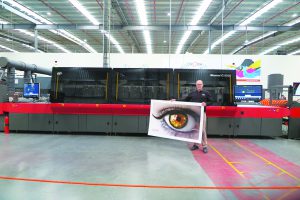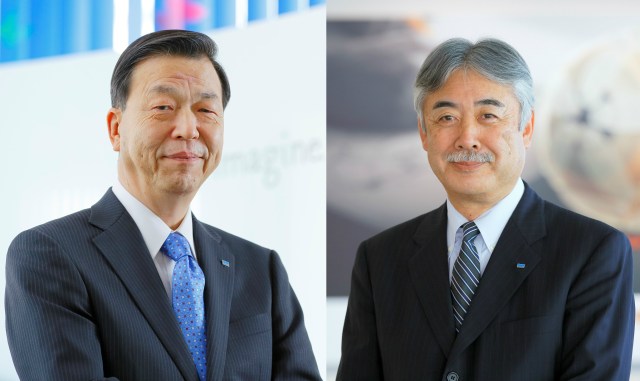
This year is proving to be one of the biggest in the 30-year history of EFI since it was founded in 1989 by Israeli namesake and the man behind Scitex, Efraim (Efi) Arazi.
In April came the announcement that New York-based venture capital firm, Siris Capital Group, would acquire EFI for US$1.7 billion through its Technology Buyout Fund. The deal was concluded three months later and shortly after that, it was announced on August 14 that veteran print industry figure, Jeff Jacobson was appointed as EFI’s executive chairman and CEO.
Jacobson’s credentials that got him selected for the role are powerful and have been gained over a 30-year career in the printing industry, with many of them at the helm of major players in commercial and more recently, digital print.
This includes Kodak Polychrome Graphics, Kodak’s Graphic Communications Group, Presstek and Xerox. He has also served as a director on the management boards of Fuji Xerox, Presstek and Xerox.
When asked how new ownership might impact existing and future customers, Jacobson said the people at the heart of EFI operations hadn’t changed and had retained the same dedication to delivering quality solutions to customers and stakeholders as ever.
“I’ve known and worked with many of them over the years in my various roles in other businesses,” he said.
“EFI’s relationships with its customers are more like partnerships. “The company’s investment in R&D has been very important to its growth and reputation, and for years, this has set it apart from its competitors. Having a partner at the forefront of innovation has helped EFI’s customers rise to the top of their areas of operation – and has kept them there.
“This commitment to R&D will continue under the ownership of Siris, which is a tech fund after all, and has great understanding of the need for continued improvement and renewal of existing products, whilst coming up with new solutions for tomorrow.”
Powering EFI’s industrial transformation business model is its commitment to reinvest a sizable portion of its revenues on research and development annually; historically, the company has devoted a whopping 16 per cent of revenue to R&D each year.
Whilst organic growth born out of its intensive R&D programme will continue, Jacobson admitted that much of EFI’s growth has, in the past, come from a spate of mergers and acquisitions.
“EFI’s acquisitions have been both tactical and opportunistic, and have got us into growth markets such as industrial inkjet quickly,” he said.
“Whether organically or through targeted acquisition, EFI will continue to grow in existing and new business areas through the best use of its resources.”

When asked why Siris had become interested in the EFI business as a target for investment and acquisition, Jacobson said, “There were multiple factors interesting to Siris.
“It was a nice sized business, a clear leader with a number one or number two position in its markets, and was a tech-based business.
“As a tech fund, it was clear that Siris would be attracted to invest in a business driving the transition from analogue to digital technology.”
With the strong backing of Siris, it is possible that EFI will leverage its expertise, R&D and manufacturing capacity in order to develop business activities outside of the printing and graphic communications space in which it has been a leader for the past 30 years.
The provision and integration of workflow and colour management solutions has become a huge part of the print sector and an area in which EFI was an early pioneer.
In the development and marketing of RIP technology and whether by direct sale or OEM bundling with other manufacturers’ systems, EFI’s Fiery has become a dominant product in the industry.
Referring to what he calls “the Fiery edge”, Jacobson said “I always say that digital printing would never have happened, nor would it have developed as quickly as it has, without EFI and Fiery.
“EFI has been an integral part of the digital print space for its entire 30- year life,” Jacobson continued, “and whilst there is always competition in a maturing market like this, we have a distinct advantage.”
Having been a very acquisitive player in the software space, particularly in management information systems (MIS) and web-to-print (W2P), Jacobson was asked if this acquisitiveness is likely to continue.
He said, “Over the years, EFI has acquired upwards of 25 software companies in what was a fragmented business space. The result is a clear leadership position and a clear path.”
Though the EFI portfolio in this area is roughly where he’d like it to be, Jacobson did not rule out further acquisitions when they made sense.
His predecessor, Guy Gecht, moved EFI in the direction of textile printing and the company acquired respected Italian textile printing machinery company, Reggiani Macchine, signalling a growing interest in this high growth segment.
Combine this with a philosophy shared by both EFI and its new owner, Siris Capital, recognising the value attached to enabling the transition from analogue to digital manufacturing in print explains a growing interest in both textile and package printing. Packaging remains robust, and demand continues to grow, especially in short run and versioning.
“Less than five per cent of textiles and less than one per cent of corrugated packaging is printed digitally, and these areas offer huge opportunity for EFI and its customers,” Jacobson added.
EFI’s partnership with Australian-owned packaging giant, Orora, resulted in the first local investment in not one, but two high-end EFI Nozomi C18000 single-pass LED inkjet corrugated packaging presses.
This on the surface, a modest foray by EFI into the digital packaging business, would appear to be just the tip of an iceberg and the market should expect a great deal more in this segment from the Silicon Valley, California-based tech giant of print.
Jacobson, the product and business development gurus at EFI and the board of Siris Capital will all be looking closely at the business opportunities offered in these two segments in particular, moving forward.
Little could founder Efi Arazi have known when he started Electronics For Imaging (EFI) in North Beach, San Francisco back in 1989 with just 18 employees generating a turnover of US$1.7 million that, 30 years on, the company he founded would employ 3000 people worldwide and be sold to a private equity firm for exactly one thousand times its first year’s earnings – US$1.7 billion.
Comment below to have your say on this story.
If you have a news story or tip-off, get in touch at editorial@sprinter.com.au.
Sign up to the Sprinter newsletter

